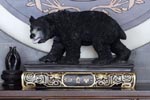Proview says it will sue Apple
Updated: 2012-02-18 10:43
By Tang Yue (China Daily)
|
|||||||||||
Company's claim over trademark could go as high as $2 billion
Beijing - The dispute between Proview and Apple over the iPad trademark heated up on Friday when Proview said it would sue the US tech giant for a violation of their agreement by using the trademark to compete against it.
"If everything goes well, we might file a claim against Apple in the United States a month from now," Yang Long San, founder of the Proview Group, said in a news conference in Beijing.
According to Proview, IP Application Development, which bought the trademark in 2009 from the Taiwan-based Proview Electronics and then sold it to Apple, promised it would not produce anything that competes with Proview's products with the same trademark.
Yang said Proview started producing a device called Internet Personal Access Device in 2000 that looks like a small ordinary PC and uses touch-panel technology. The products were sold in Europe and the US, Yang said.
"According to international trademark law, despite the differences between the appearance and technology of the iPad of Proview and that of Apple, they belong to the same category. So Apple was in breach of the contract," Xie Xianghui, a lawyer representing Proview Technology Shenzhen, told China Daily.
Li Su, a Proview consultant who was also present at the news conference, said he had talked to three lawyers in the US and had been told the claim could go up to $2 billion.
When China Daily reached Apple after the news conference, it reiterated its statement on Wendesday which accused Proview Technology of not honoring its agreement to transfer the rights to use the trademark for the product in China and claimed it has obtained the rights several years ago.
In response, Proview insisted that the trademark on the Chinese mainland, which is owned by the Shenzhen-based Proview Technology, was not legally integrated in the deal between Proview Electronics and IP Application.
Proview Technology Shenzhen still holds the rights to the trademark it registered in 2001, according to the website of China's trademark authority. It said that Proview Electronics Taiwan and Proview Technology Shenzhen were associated but separate entities.
A local court in Shenzhen backed Proview Shenzhen in December and rejected Apple's claim to the trademark on the Chinese mainland.
The court at Huizhou, Guangdong province, also ruled on Friday in favor of Proview Technology, deciding it was illegal for Sundan, a major electronic appliance store in China, to sell iPads.
Proview also filed suit against Gome, another electronics giant in Shenzhen and against the Apple Store in Shanghai.
Media have reported that some stores in Shijiazhuang and Xuzhou have stopped selling the products.
Xie said they have spoken to authorities in more than 40 cities and two-thirds are conducting investigations.
A few e-mails between Proview and IP Application ahead of the agreement were also posted online on Thursday as the dispute heated. The e-mails showed Huy Yuan, a representative from Proview, was from the Shenzhen-based company.
Just because the e-mails came from Shenzhen does not legalize the transfer of the iPad trademark on the Chinese mainland, said Li, who is also president of the Hejun Vanguard Group.
"Proview has its headquarters in Shenzhen, so it's normal to send the e-mail from Shenzhen," he said.
The current net liabilities of Proview International amount to 2.87 billion yuan ($456 million). All Proview International assets, including the trademark 'iPad', have been seized as collateral by the eight banks.
"Apple sent lawyers to negotiate a commercial solution with the eight banks in 2010, but it doesn't admit it now," Proview said in a statement on Friday.
Yang also denied reports that Proview once asked Apple for 10 billion yuan for the use of the trademark in China.
"We haven't come up with any figure to date. We just have to be responsible for our financial obligations," he said.
Wang Huazhong contributed to this story.









